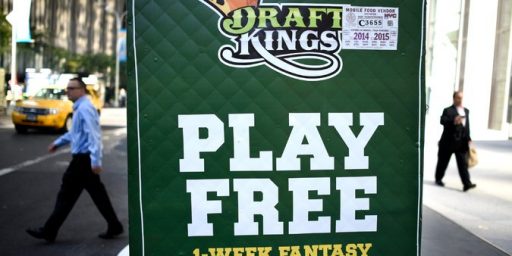Supreme Court Justices Appear Skeptical Of Law Barring Legalization Of Sports Gambling
The Supreme Court heard argument today in a case challenging a 1992 law barring sports gambling in all but a handful of states, and the Justices appeared skeptical of the law.
Today the Supreme Court heard oral argument in a case challenging a 1992 Federal law that barred all but a select few states from legalizing sports gambling and initial analysis seems to suggest that the Justices are skeptical of the constitutionality of the law:
WASHINGTON — A federal law that effectively bans commercial sports gambling across most of the nation faced skepticism at the Supreme Court on Monday. A majority of the justices indicated that the law had crossed a constitutional line by requiring states to do the bidding of the federal government.
New Jersey is leading the challenge to the law, and Chris Christie, the state’s governor, watched the argument from the front row.
Americans are estimated to annually place $150 billion in illegal wagers on sports. If the Supreme Court strikes down the law, dozens of states could quickly make such wagers legal and reap tax revenues from them.
The court’s decision, expected by June, could also affect other conflicts between federal and state authorities. At Monday’s argument, Justice Sonia Sotomayor said some forms of federal regulation of marijuana could be threatened by a ruling that allows sports betting.
The betting law, the Professional and Amateur Sports Protection Act of 1992, prohibited states from authorizing sports gambling. It exempted Nevada, where sports betting has long been legal, along with sports lotteries in Delaware, Montana and Oregon. Other states were given a year to opt in, but none acted in time.
(…)
“The citizens of the State of New Jersey are bound to obey a law that the state doesn’t want but that the federal government compels the state to have,” said Justice Anthony M. Kennedy.
He said that crossed a constitutional line and blurred the political accountability of elected officials. “The citizen doesn’t know,” he said. “Is this coming from the federal government? Is this coming from the state government? That’s precisely what federalism is designed to prevent.”
The Supreme Court has said that the federal government may not commandeer state resources to achieve federal objectives. On the other hand, the court has said that the federal government may regulate all sorts of things directly and that federal laws pre-empt contrary state laws under the Constitution’s supremacy clause.
Most of Monday’s argument in Christie v. National Collegiate Athletic Association, No. 16-476, was an effort to decide whether the 1992 law amounted to unconstitutional commandeering or permissible pre-emption.
Theodore B. Olson, a lawyer for New Jersey, said the law was a “direct command” to the states rather than a federal effort to regulate sports betting.
Justice Stephen G. Breyer proposed a distinction. The federal government can first make a policy determination to regulate an activity, he said. “Once it makes that determination, it can forbid state laws inconsistent with that determination,” he said. “That’s called pre-emption.” What it cannot do, he added, “is to tell the state how to legislate.”
Mr. Olson agreed. “I wish I had said that myself, Justice Breyer,” he said.
Justice Elena Kagan did not seem fully persuaded, asking whether state officials were required to do anything in particular by the 1992 law. “Who is being conscripted in order to do what here?” she asked.
Paul D. Clement, a lawyer for the sports leagues and Mr. Olson’s successor as solicitor general in the George W. Bush administration, said the 1992 law was part of a set of regulations establishing federal policy. “Congress in all of these statutes did not want there to be sports gambling schemes operating in interstate commerce,” he said.
Jeffrey B. Wall, a deputy solicitor general who argued in support of the leagues, said New Jersey was not entitled to repeal only a part of its law, thereby “channeling sports gambling to particular state-preferred providers.” He added that the federal government would not object to a wholesale repeal of the state law.
“The problem that Congress was confronting was state sponsored and sanctioned sports gambling schemes,” Mr. Wall said. “It didn’t care if I bet with my buddy on the Redskins game or we had an office pool. It wasn’t going after all sports gambling.”
Amy Howe at SCOTUSBlog summarizes today’s argument:
The law before the court is the Professional and Amateur Sports Protection Act, which Congress passed in 1992. PASPA bans sports gambling in all but four states – Delaware, Montana, Nevada and Oregon – that already permitted it, and it would also have allowed sports betting at casinos in New Jersey as long as the state set up the scheme within one year after PASPA went into effect. New Jersey didn’t act then to establish a sports-betting program, but it changed its mind in 2012, when it passed a law legalizing sports betting.
The NCAA and the four major professional sports leagues – the National Basketball Association, the National Football League, the National Hockey League and Major League Baseball – challenged the 2012 law, arguing that it violated PASPA. Federal courts sided with the NCAA and the leagues, rejecting the state’s argument that PASPA violates the 10th Amendment on the ground that the law does not require the states to do anything. After those rulings, the New Jersey legislature tried again, with a new law: Instead of authorizing sports betting, the 2014 law repealed existing bans on sports betting, at least as they applied to New Jersey casinos and racetracks. But the NCAA and the leagues challenged the new law, and the U.S. Court of Appeals for the 3rd Circuit once again ruled in their favor and invalidated it.
With its governor, Chris Christie, in attendance today at the Supreme Court, New Jersey seemed to find a more sympathetic audience in the justices. Representing the state, attorney Ted Olson stressed that the Founding Fathers had wanted to replace the failed confederacy of states with a national government that would regulate people, but not states. But despite that intent, he emphasized, PASPA is a “direct command” to the states.
Some of the court’s more liberal justices were skeptical, comparing PASPA’s effect with the well-established doctrine of pre-emption, in which federal laws trump conflicting state laws. Olson countered that the federal government could opt to regulate sports betting itself, which would supersede state laws like New Jersey’s. But Congress hasn’t done so here, Olson noted. Instead, PASPA simply tells the states what to do – which violates the Constitution.
Justice Elena Kagan was unconvinced. You are suggesting, she told Olson, that Congress can only pre-empt state laws if it enacts a comprehensive regulatory scheme. But how, she asked, do we know when the scheme is sufficiently detailed?
Kagan also had questions about Olson’s efforts to rely on the Supreme Court’s earlier cases on the 10th Amendment and the anti-commandeering doctrine. If the gist of those cases is that the federal government can’t conscript state officials to do its work, she said, whom is PASPA “conscripting”?
Olson responded that PASPA tells New Jersey that it cannot regulate sports gambling the way it would otherwise choose to do. But Justice Sonia Sotomayor was dubious that PASPA requires the states to act. The law doesn’t tell the state that it has to enforce PASPA, she pointed out. “States make choices all the time” about what laws to enforce, she suggested; if they tried to enforce all of their laws all the time, they would go bankrupt.
Justice Anthony Kennedy was more receptive to this argument. He told Paul Clement, who argued on behalf of the NCAA and the leagues, that PASPA “leaves in place a state law that the state does not want, so the citizens of the State of New Jersey are bound to obey a law that the state does not want but that the federal government compels the state to have.” That’s commandeering, Kennedy said.
A few minutes later, in response to a hypothetical question from Chief Justice John Roberts about whether the federal government could order the states to reduce their expenditures on state pension benefits, Kennedy complained that such a scenario “blurs political accountability” because citizens don’t know whether the policy is coming from the federal or state government. “That’s precisely what federalism is designed to prevent,” Kennedy concluded.
Roberts chimed in, pointing out that if Congress wanted to impose a flat ban on sports gambling, it could have done so itself and included a clause that specifically indicated that conflicting state laws are pre-empted. Justice Samuel Alito echoed this sentiment, telling Clement that “Congress could have prohibited sports gambling itself.” “So what federal policy is served” by PASPA, Alito asked Clement, that would not have been served by a congressional ban?
Justice Neil Gorsuch added that enacting a law like PASPA, which would require the states to enforce the ban on sports gambling, would be cheaper than a federal ban because it would not require the federal government to spend any money of its own.
Perhaps most crucially for New Jersey, Justice Stephen Breyer pressed Clement to explain Congress’ goal in enacting PASPA. When Clement responded that Congress wanted to eliminate “state-sponsored or -operated gambling taking place by either individuals or the state,” Breyer pounced. That means, he observed, “there is no interstate policy other than the interstate policy of telling the states what to do.”
As I’ve said before, one should always be skeptical about trying to determine the outcome of a case based on oral argument. Sometimes, judges ask questions for reasons that have nothing to do with how they may be leaning in a particular case. In some cases, it’s because they are attempting to get one side or the other to address a question that came up while reviewing the briefs filed in the case, or to address an issue raised by one of the briefs filed by third parties in connection with the case that aren’t necessarily addressed in the main briefs. In others, they may be attempting to address issues raised by a fellow Justice in their line of questioning or to aide one side or the other in addressing something that was not clearly addressed in response to a previous question. In some cases, they’re asking questions for purely academic reasons, which isn’t surprising given that several of the Justices spent at least part of the career after law school teaching in law school and spend some parts of their summer lecturing students in the United States and in Europe.
Notwithstanding those caveats, there is some reason for New Jersey and those supporting the idea that individual states should be free to set their own policy regarding an issue like sports gambling, especially in light of the fact that the law in question doesn’t really ban sports gambling nationwide but instead effectively provides protection to states where it is legal while hindering the rest of the country from competing against them in what would undoubtedly be a lucrative area for both local businesses and state tax revenues.
At the center of this dispute is a Federal law known as the Professional and Amateur Sports Protection Act (PASPA) which bars states from “sanctioning” sports betting. When this law was passed in 1992, however, included an exemption that provided that states that had already authorized sports gambling, or that passed laws that did such within a year after the law was enacted would be exempt from the law. At the time of its passage, only four states — Nevada, Oregon, Delaware, and Montana, had authorized sports betting and, at this point, the only state that has an active sports gambling industry is Nevada, where the activity brings in billions of dollars of business and revenue on an annual basis. No states moved to take advantage of the one-year exemption period after the law was passed. On some level, this exemption seems to be unfair to say the least and a perhaps a clear violation of the principles of federalism on which the Constitution is built.
Moreover, as I have argued in the past, is seems clear that New Jersey has the better case here:
Much like the arguments against legalizing marijuana, there really isn’t any argument against sports gambling that doesn’t boil down to the fact that some people don’t like the choices that other people make and try to use the power of the state to prevent them from making them. Prohibition and the War On Drugs, however, have shown us that making something people want to do illegal just forces it underground. The practice is already legal in Nevada, where there is an active business, and three other states, it’s legal overseas where it it common for people to place bets on American sporting events, and, of course, it occurs in the less than legal venues of person-to-person wagering and operations run by organized crime. Given all of that, there really doesn’t seem to be any reason why it should not be permissible for government to allow sports gaming to be a legal business that takes place out in the open rather than something that takes place in back rooms run by criminals. Ideally, Congress and the states should get out of the way and let the marketplace decide if there really is a big market for sports gaming in the United States. The political influence of the major sports leagues makes it unlikely this will happen in the short term, of course, which is why the course New Jersey has taken these last several years through the court system necessary. I for one hope they succeed.
Additionally, there is a strong argument that the PASPA itself is unconstitutional because it is not authorized by the Commerce Clause and conflicts with an individual state’s rights to establish its own laws on an issue such as this under the Tenth Amendment. Based on today’s oral argument, it appears there may be a majority of Justices who agree with this argument.
We’ll know by the end of the current Supreme Court term in June, and perhaps much sooner than that, where the Justices actually fall, but here’s hoping that they strike the law down and allow the states to set their own policy in an area that, in the end, really shouldn’t be the business of Congress and the Federal Government to begin with.
Here’s the transcript of today’s argument:
Christie Et Al v. NCAA Et Al Transcript by Doug Mataconis on Scribd




Yet most of those involved in this legal battle either way will turn around and place bets in some sort of office pool set up for the college football playoffs. In which most of them will take Clemson in 5.
“No states moved to take advantage of the one-year exemption period after the law was passed.”
I agree the law is no good, but why didn’t NJ take advantage of the one-year exemption period? That was dumb on their part considering how it was a gambling state
They should leave it up to the states. If a state has legalized gambling establishments and laws (outside of native american reservations etc…) they should be allowed to have regulated sports betting within those casinos – The online aspect of it, and regulation by state etc.. I think would be a little more hairy…
I guess the Supremes don’t have the option of saying, “With respect to having a strong, prosperous, and just nation, this is complete trivia and beneath out notice.” Oh wait, they did.
I’m surprised the pro leagues are fighting gambling. I’ve read they want gambling terminals in the stadiums. Maybe the NJ law doesn’t allow them a big enough cut. As to the NAACP, they’re fighting to hold a boat that already sailed. Everyone involved in college sports is already making money. Except the players. At least legally.
Pro tip: if it’s already legal in some states, but making it legal in others would be The End of Society As We Know It… someone is making a fortune under the table.
Seriously, how is this hard? Either it needs to be illegal in Nevada, or legal everywhere else. Duh.
@DrDaveT:
Seriously, how is this hard? Either it needs to be illegal in Nevada, or legal everywhere else. Duh.
Not too familiar with Federalism, are you?
@B. R. Bong: Not as much about Federalism as it is about Mercantilism. The government in the 1992 law created a protected class of enterprise by denying other states the right to participate. While the one year window could argue opportunity, that argument begs the question of whether the window can be passed through in a year. That no state chose to seems to argue against a year being adequate time.
Does this mean Pete Rose still has a chance to get into the Baseball Hall of Fame?
I have to admit, I don’t see the difference between legalized lotteries and betting on sports. For that matter, I’m not sure there’s a difference between playing the stock market and betting on sports, other than fans typically have more info about sports teams than investor’s have about the companies they invest in.
@B. R. Bong:
Um, you do realize that we’re talking about Supreme Court review of a Federal law here, right? It’s one thing to say “Let the several states decide for themselves.” It’s another entirely to pass (or defend) a Federal law that says “All states are equal, except for these four.”
Try again.